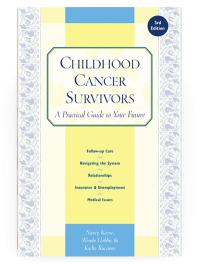Childhood Cancer Survivors
Survival guilt
Some survivors feel guilty that they survived when so many others did not. Sometimes they feel life is going to be short, so they must push themselves very hard. Because they feel they don’t have much time, they want to squeeze in as much as possible.
The thing that I wrestle with all the time is survivor guilt. When children I know die, I almost can’t look their parents in the face. I know in my head that it’s not my fault, but it never feels like enough. I feel like saying, “I’m sorry I am here and your daughter is not; I wish to God I could change it.” The best that I can do is share something special that I remember. It’s a poor comfort, but at least somebody remembers. There is a lot in the storyteller concept. There’s a great line in Miss Rose White where she says, “If I forget, who will remember?”
• • • • •
Survivor guilt is a real problem. Often I find myself caught between needing to share my concerns and feeling guilty because I’m alive, I’m doing well, and so many aren’t. It’s a tough line to walk. I have found a great deal of comfort from reading Holocaust literature. Presently I’m reading Night, by Elie Wiesel, which is absolutely gripping. Frankly, I think there are a lot of similarities.
One of the hardest things to learn to realize is that we can’t change certain things. My life did not come at the expense of anyone else’s. If I could do anything to save theirs, I would do so gladly.
• • • • •
Five years ago today, I gave a mini-memorial-eulogy for my best friend, who died following a second BMT (bone marrow transplant) at the very medical center where I now work. She was a sweet and kind and gentle and bright young woman, and her death left me with so many questions. Five years later I still can’t say I have all the answers, but I have come to some peace with matters. Not the wrong kind—the kind that becomes complacent with seeing these things happen—but the kind that lets me understand that I cannot hold myself responsible for them.
Another form of guilt that survivors with many late effects sometimes feel is related to the effect their limitations have on those they love.
My survivor’s guilt has a different cause. I feel guilty about how much my need for high maintenance affects and limits my husband’s choices about work, life and health insurance, where we live, how much extra money there is for recreation, how he has to go to many things by himself, how many chores I have to leave for him because it’s too heavy. The list goes on. I know he is also gaining some things, too, like gold stars and a pair of angel wings.
Some families have genetic forms of cancer that are passed from parent to child through genes. When a child develops cancer, some parents feel very guilty that their genes are the cause of their child’s suffering.
I had neuroblastoma, and my daughter was born with neuroblastoma. I was angry that I passed it on to her although I knew it wasn’t my fault. At one point I made a comment to my minister about it, and he looked at me and said, “You didn’t ask for your genes either, did you?” I realized he was right and that was the end of that.
Another variation on survivor guilt is that some survivors are burdened by what feels like extra-high expectations about what they will do with their lives and what they will achieve. They have the sense that they are expected to do more than the average person, because they survived cancer. And they may feel guilty about just wanting to be themselves without the added weight of super-size expectations.
Table of Contents
All Guides- 1. Survivorship
- 2. Emotions
- 3. Relationships
- 4. Navigating the System
- 5. Staying Healthy
- 6. Diseases
- 7. Fatigue
- 8. Brain and Nerves
- 9. Hormone-Producing Glands
- 10. Eyes and Ears
- 11. Head and Neck
- 12. Heart and Blood Vessels
- 13. Lungs
- 14. Kidneys, Bladder, and Genitals
- 15. Liver, Stomach, and Intestines
- 16. Immune System
- 17. Muscles and Bones
- 18. Skin, Breasts, and Hair
- 19. Second Cancers
- 20. Homage
- Appendix A. Survivor Sketches
- Appendix B. Resources
- Appendix C. References
- Appendix D. About the Authors
- Appendix E. Childhood Cancer Guides (TM)

